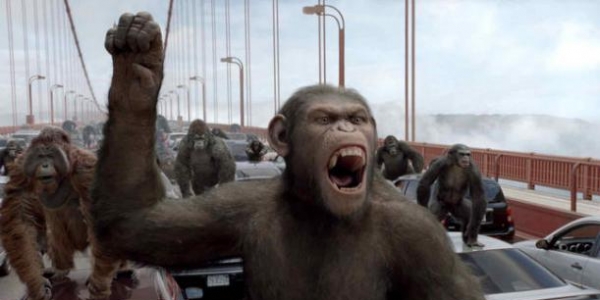Although Rise Of The Planet Of The Apes bears no relation to the 1968 original, it has been inspired by the Pierre Boulle novel. It also shares some concerns with the recent eye opening and shocking documentary Project Nim, which recently screened at MIFF. Written by husband and wife team Rick Jaffa and Amanda Silver (The Relic, etc) this origin story remains steadfastly earthbound.
The setting is San Francisco. Dedicated scientist Will Rodman (James Franco) works for drug company GenSys, and is experimenting with ALZ 112, a new drug that may cure Alzheimer’s. Tests on an ape known as “Bright Eyes” have proved successful. But when something goes wrong and Bright Eyes runs amok, Jacobs (David Oyelowe), the laboratory director, orders the project shut down and all the test animals to be exterminated. Caesar is Bright Eyes’ baby that survives, and Rodman takes him home until he can work out what to do.
But Caesar, who has inherited his mother’s genetically enhanced intelligence, proves to be a big help with his father (John Lithgow), who is suffering from the debilitating disease. Over the next five years, Caesar (Andy Serkis) becomes part of Rodman’s family. But following an ugly incident involving a neighbour, Caesar is locked away in an animal shelter, where he is mistreated by the cruel and unsympathetic handlers, one in particular played by Tom Felton in his first post-Harry Potter role. The name of Felton’s character Dodge Landon is derived from the surnames of two of the astronauts from the original, one of several sly references to that film here.
iring of the mistreatment, the super intelligent Caesar organises the other apes to rise up, break out of the shelter, and run amok through San Francisco. The major achievement of the film here is that we cheer on the apes as they make their break for freedom. There is an exciting showdown on the Golden Gate Bridge that is riveting stuff.
Rise Of The Planet Of The Apes is an intelligent and thoughtful science fiction tale with a strong cautionary message about genetic tampering and the limitations of science that will brings about mankind’s downfall. British director Rupert Wyatt (The Escapist, etc) handles the action sequences well. But he also gives the film a solid emotional core and its own identity distinct from other films in the franchise. A clever post credits coda suggests what happens next.
The special effects from Joe Letteri’s team at New Zealand’s WETA Digital are excellent. Special effects technology has come a long way since the original film, which won an Oscar for its then state of the art make-up effects that convincingly transformed the actors into apes. Here though the apes a CGI-created, but they are realistic and superbly incorporated into the live action. Caesar especially is suffused with a very real personality and given human traits, that draws the audience into his plight. Caesar was brought vividly to life by Serkis (Gollum in The Lord Of The Rings, etc), using the same sort of performance motion capture technology used to create realistic emotional reactions for CGI-characters in films like Avatar, A Christmas Carol, etc.
Franco, who may not have been able to carry off an Oscars telecast, proves he can carry a big budget effects driven blockbuster and he brings a certain humanity and intelligence to his role. The solid support cast includes Slumdog Millionaire’s Freida Pinto as a vet who becomes Rodman’s love interest and the film’s ethical conscience, and Brian Cox is convincing as the shelter’s apathetic supervisor. Lithgow also brings a sympathetic touch to his role.







